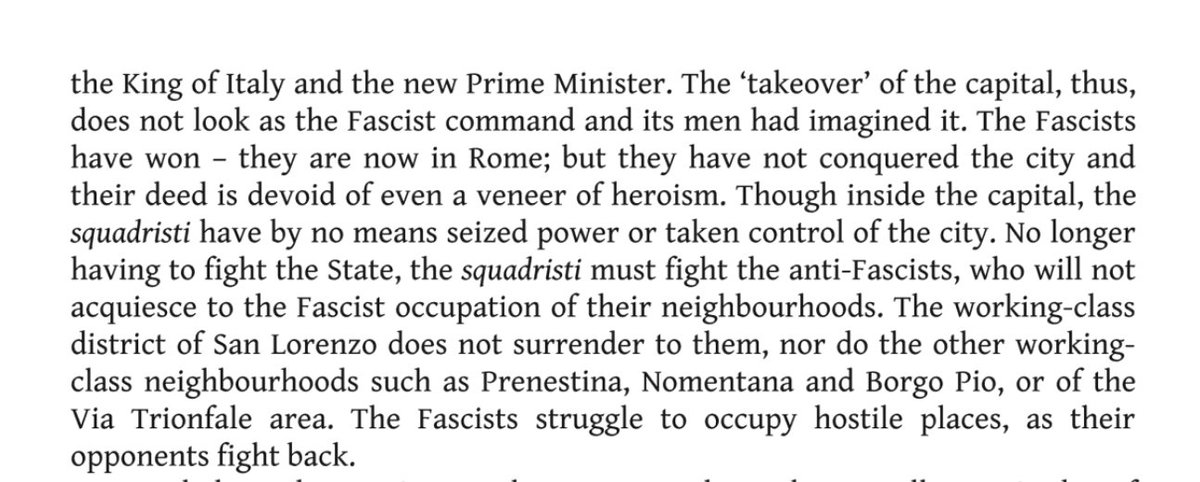If you think the attempted coup at our Capitol was a one-time fluke that will dissipate, history would like a word.
Let's go back to 1922 for a thread about how fascist mob violence escalates. (Note: Some of these details, while not graphic, might be triggering.)
Let's go back to 1922 for a thread about how fascist mob violence escalates. (Note: Some of these details, while not graphic, might be triggering.)
The fascist takeover of Italy in 1922 is often remembered as a violent revolution, which it certainly was—but that's not at all how it began. It began with a mob being allowed to stroll into Rome and occupy (albeit unofficially) the workings of government.
In a scene that might sound familiar to Americans in 2021, the fascist mob that arrived in Rome was greeted not by armed government resistance but by an open door. Here's a telling excerpt from 2019's "The March on Rome" by Giulia Albanese:
It's tempting to look back on that moment and assume it meant the capital/government were already fascist-sympathetic. But in fact, the group had tacit support from the only person it needed: the king.
The Italian government and army were ready (and easily well equipped) to fight back the fascist mob. Prime Minister Luigi Facta drafted an order of martial law and readied Rome's defenses. But his orders were canceled by King Victor Emmanuel III. The fascists would be let in.
The king was hoping to avoid violence, but he also seemed confident that the fascists would support his reign. He named Benito Mussolini, fascist leader and complete political novice, as his new prime minister.
What followed is surreal but now suddenly easy to picture in 2021. Fascists literally occupied buildings of government as the royalist army--which, again, could have easily pushed them back--was told by the king to stand down.
With no will for resistance from the king, fighting back the fascists was left to loosely organized civilians: anti-fascists. A civil war rages in the streets as the government sits idly by. Again from Albanese's "March on Rome":
And so the fascists conquer Italy not through an armed revolution against the government, but through mob violence quietly tolerated by the country's weak-willed, dotard of a ruler.
The next year (1923), Mussolini's success inspired Adolf Hitler to try a similar move. He assembled a group of 600 fascist supporters and marched them to the Bürgerbräukeller beer hall in Munich to either enlist or depose Bavaria's right-wing politicians.
Hitler's mob grew to about 2,000 as local right-wingers swelled its ranks, and they easily occupied the local police headquarters. But then they ran into something Mussolini hadn't: a bare minimum of government resistance.
How easy is it for a professional military to repel a mob? Very. A mere 130 soldiers under the leadership of a state police lieutenant blocked the 2,000 Nazis from entering the Bavarian Defense Ministry. Four police and 16 Nazis died, and Hitler's attempted coup scattered.
Obviously, that wasn't the end of Hitler. In a scenario I fear we'll see soon echoed in 2021, Hitler and the other mob organizers were given prison sentences that they served for only a scant amount of time. (Hitler's 5-year sentence ended after 9 months.)
During that time, Hitler learned from his failed coup, wrote Mein Kampf, and plotted the next phase of his plan to overthrow the Weimar Republic. Mob violence was to remain a core tactic of his rebellion, but bolstered by legal means of eroding democracy.
The Nazis were never elected as a majority to lead Germany, nor did they storm Berlin in armed revolt. Instead, they used anti-Semitism and anti-socialist rhetoric to build a base of support that got their members elected into parliament and their leaders placed in key offices.
Today we see modern equivalents in democratically elected American fascists like Mo Brooks, Tommy Tuberville, Josh Hawley, Paul Gosar and many. more. They advocate for overthrowing democracy from within the system and tacitly support mob violence from without.
Hitler's mob didn't dissipate after the Beer Hall Putsch. It grew quieter and more patient. Despite a democratically elected leadership that opposed them, fascists gathered enough political and public support (without ever gaining a majority) to upend their government.
So why am I so panicked this week? Why isn't the imminent inauguration of Joe Biden and the Democratic control of both Congressional houses enough to calm my nerves? Because history tells me to worry.
We are at a turning point like no other in my lifetime. A right-wing mob occupied our Capitol building and ejected our Senate, disrupting our democratic process, with absolute ease. They were not defeated. They were successful.
One ray of hope: Merrick Garland. As our new attorney general, he will lead our government's fight against what is sure to be a long and unrelenting campaign of right-wing intimidation, violence and terrorism.
While I favored my fellow Alabamian and hero Doug Jones for the AG role, there's no denying that Garland—who led the prosecution of the white supremacist Oklahoma City bombers—will keep a close, experienced eye on the aspiring revolutionaries aiming to finish what Trump started.
Stay vigilant, read more history books, support people of color and immigrants with all your heart and your actions. Whatever you do, don't think what we saw this week is over. We have to care as deeply about this democracy as the mob does about destroying it.

 Read on Twitter
Read on Twitter



